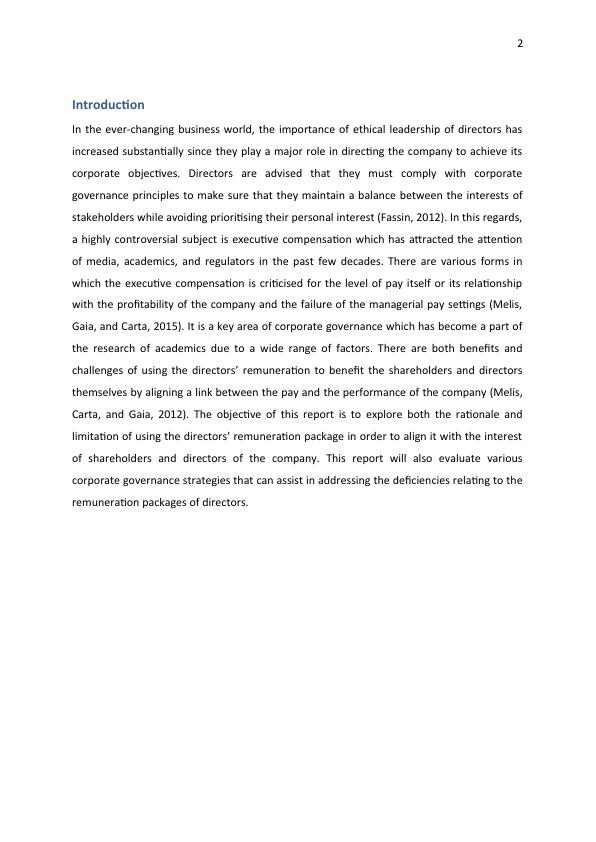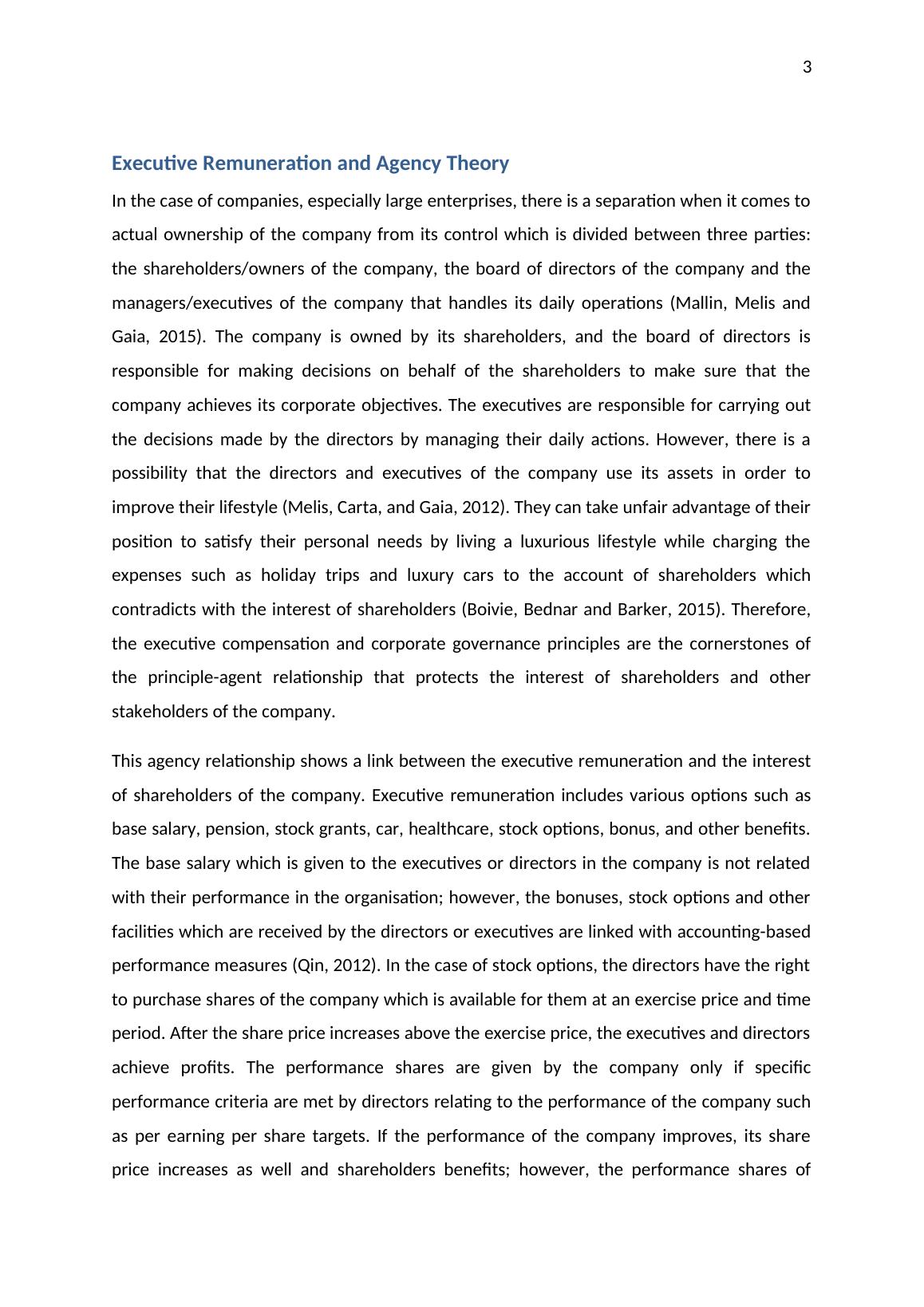Corporate Governance: Aligning Directors' Remuneration Package
Added on 2023-01-13
14 Pages4085 Words43 Views
0
Corporate Governance
Corporate Governance

1
Table of Contents
Introduction...............................................................................................................................2
Executive Remuneration and Agency Theory............................................................................3
Positive implication of aligning directors’ remuneration package............................................4
Limitations of aligning directors’ remuneration package..........................................................5
Corporate Governance Strategies..............................................................................................7
Conclusion................................................................................................................................10
References................................................................................................................................11
Table of Contents
Introduction...............................................................................................................................2
Executive Remuneration and Agency Theory............................................................................3
Positive implication of aligning directors’ remuneration package............................................4
Limitations of aligning directors’ remuneration package..........................................................5
Corporate Governance Strategies..............................................................................................7
Conclusion................................................................................................................................10
References................................................................................................................................11

2
Introduction
In the ever-changing business world, the importance of ethical leadership of directors has
increased substantially since they play a major role in directing the company to achieve its
corporate objectives. Directors are advised that they must comply with corporate
governance principles to make sure that they maintain a balance between the interests of
stakeholders while avoiding prioritising their personal interest (Fassin, 2012). In this regards,
a highly controversial subject is executive compensation which has attracted the attention
of media, academics, and regulators in the past few decades. There are various forms in
which the executive compensation is criticised for the level of pay itself or its relationship
with the profitability of the company and the failure of the managerial pay settings (Melis,
Gaia, and Carta, 2015). It is a key area of corporate governance which has become a part of
the research of academics due to a wide range of factors. There are both benefits and
challenges of using the directors’ remuneration to benefit the shareholders and directors
themselves by aligning a link between the pay and the performance of the company (Melis,
Carta, and Gaia, 2012). The objective of this report is to explore both the rationale and
limitation of using the directors’ remuneration package in order to align it with the interest
of shareholders and directors of the company. This report will also evaluate various
corporate governance strategies that can assist in addressing the deficiencies relating to the
remuneration packages of directors.
Introduction
In the ever-changing business world, the importance of ethical leadership of directors has
increased substantially since they play a major role in directing the company to achieve its
corporate objectives. Directors are advised that they must comply with corporate
governance principles to make sure that they maintain a balance between the interests of
stakeholders while avoiding prioritising their personal interest (Fassin, 2012). In this regards,
a highly controversial subject is executive compensation which has attracted the attention
of media, academics, and regulators in the past few decades. There are various forms in
which the executive compensation is criticised for the level of pay itself or its relationship
with the profitability of the company and the failure of the managerial pay settings (Melis,
Gaia, and Carta, 2015). It is a key area of corporate governance which has become a part of
the research of academics due to a wide range of factors. There are both benefits and
challenges of using the directors’ remuneration to benefit the shareholders and directors
themselves by aligning a link between the pay and the performance of the company (Melis,
Carta, and Gaia, 2012). The objective of this report is to explore both the rationale and
limitation of using the directors’ remuneration package in order to align it with the interest
of shareholders and directors of the company. This report will also evaluate various
corporate governance strategies that can assist in addressing the deficiencies relating to the
remuneration packages of directors.

3
Executive Remuneration and Agency Theory
In the case of companies, especially large enterprises, there is a separation when it comes to
actual ownership of the company from its control which is divided between three parties:
the shareholders/owners of the company, the board of directors of the company and the
managers/executives of the company that handles its daily operations (Mallin, Melis and
Gaia, 2015). The company is owned by its shareholders, and the board of directors is
responsible for making decisions on behalf of the shareholders to make sure that the
company achieves its corporate objectives. The executives are responsible for carrying out
the decisions made by the directors by managing their daily actions. However, there is a
possibility that the directors and executives of the company use its assets in order to
improve their lifestyle (Melis, Carta, and Gaia, 2012). They can take unfair advantage of their
position to satisfy their personal needs by living a luxurious lifestyle while charging the
expenses such as holiday trips and luxury cars to the account of shareholders which
contradicts with the interest of shareholders (Boivie, Bednar and Barker, 2015). Therefore,
the executive compensation and corporate governance principles are the cornerstones of
the principle-agent relationship that protects the interest of shareholders and other
stakeholders of the company.
This agency relationship shows a link between the executive remuneration and the interest
of shareholders of the company. Executive remuneration includes various options such as
base salary, pension, stock grants, car, healthcare, stock options, bonus, and other benefits.
The base salary which is given to the executives or directors in the company is not related
with their performance in the organisation; however, the bonuses, stock options and other
facilities which are received by the directors or executives are linked with accounting-based
performance measures (Qin, 2012). In the case of stock options, the directors have the right
to purchase shares of the company which is available for them at an exercise price and time
period. After the share price increases above the exercise price, the executives and directors
achieve profits. The performance shares are given by the company only if specific
performance criteria are met by directors relating to the performance of the company such
as per earning per share targets. If the performance of the company improves, its share
price increases as well and shareholders benefits; however, the performance shares of
Executive Remuneration and Agency Theory
In the case of companies, especially large enterprises, there is a separation when it comes to
actual ownership of the company from its control which is divided between three parties:
the shareholders/owners of the company, the board of directors of the company and the
managers/executives of the company that handles its daily operations (Mallin, Melis and
Gaia, 2015). The company is owned by its shareholders, and the board of directors is
responsible for making decisions on behalf of the shareholders to make sure that the
company achieves its corporate objectives. The executives are responsible for carrying out
the decisions made by the directors by managing their daily actions. However, there is a
possibility that the directors and executives of the company use its assets in order to
improve their lifestyle (Melis, Carta, and Gaia, 2012). They can take unfair advantage of their
position to satisfy their personal needs by living a luxurious lifestyle while charging the
expenses such as holiday trips and luxury cars to the account of shareholders which
contradicts with the interest of shareholders (Boivie, Bednar and Barker, 2015). Therefore,
the executive compensation and corporate governance principles are the cornerstones of
the principle-agent relationship that protects the interest of shareholders and other
stakeholders of the company.
This agency relationship shows a link between the executive remuneration and the interest
of shareholders of the company. Executive remuneration includes various options such as
base salary, pension, stock grants, car, healthcare, stock options, bonus, and other benefits.
The base salary which is given to the executives or directors in the company is not related
with their performance in the organisation; however, the bonuses, stock options and other
facilities which are received by the directors or executives are linked with accounting-based
performance measures (Qin, 2012). In the case of stock options, the directors have the right
to purchase shares of the company which is available for them at an exercise price and time
period. After the share price increases above the exercise price, the executives and directors
achieve profits. The performance shares are given by the company only if specific
performance criteria are met by directors relating to the performance of the company such
as per earning per share targets. If the performance of the company improves, its share
price increases as well and shareholders benefits; however, the performance shares of

End of preview
Want to access all the pages? Upload your documents or become a member.
Related Documents
(PDF) An Overview of Corporate Governancelg...
|11
|2397
|23
Ethics and Governancelg...
|15
|3548
|58
Corporate Governance and Remunerationlg...
|12
|2597
|477
(PDF) Corporate Governance and Executive Compensationlg...
|9
|683
|37
Corporate Governance and Ethics - Woolworth Groupslg...
|7
|1690
|98
Review of NAB's Executive Remuneration Strategylg...
|11
|2369
|91
